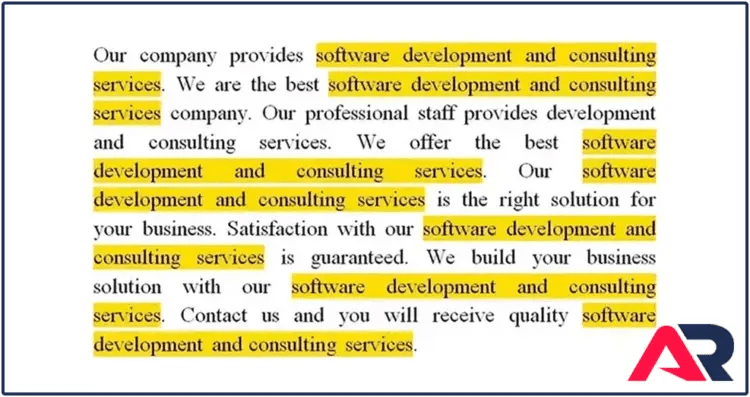Everyone, myself included, wants to create a website with a unique brand identity. However, once you create your website, most face the challenge of getting their website to rank on Google. So many people make basic SEO mistakes that damage their website authority score. This damage to their authority score also prevents their site from ranking. The purpose of this post is to discuss a few ways you may damage your website authority score. On that note, let’s dive into 7 SEO mistakes that could hurt your website authority score.
Choosing the Wrong Keywords is a Very Basic SEO Mistake
A common mistake that many make is targeting the wrong keywords. Targeting the wrong keywords can destroy even the most well-crafted SEO strategies.
You need to genuinely understand your audience if you are to target the right keywords. Find out what they’re typing into the search box and proceed to target those words and phrases.
If you’re unsure how to figure out which keywords you should target, consider the following process:
- Identify your keyword(s) is the first step to avoiding this basic SEO mistake
- Check the competition for this keyword
- Recheck the keyword
Once you identify and confirm the keywords you want to target, you can consider looking into adding some LSI keywords. Latent Semantic Indexing (LSI) keywords are a great way to help your content rank faster. They’re also a great way to make up for basic SEO mistakes you’ve overlooked.
If you’re not suren what an LSI keyword is, just scroll to the bottom of a Google search results page.

Keyword Stuffing
Keywords are without question valuable for your website in terms of SEO. However, using too many keywords brings about a negative outcome. Keyword stuffing is just bad form and bad for your website.

The example above makes it painfully clear that the author used the keyphrase way too many times. Keyword stuffing destroys your rankings. It is also a major turnoff for your readers.
If you haven’t caught on, you should avoid this tactic at all costs. Instead, sprinkle in your keywords (or keyphrase) when it makes sense. This can occur in both your headers and body content.
Ignoring Meta Descriptions and Title Tags
Keywords aren’t the only factor that determines whether your site will rank on Google. Two of these other contributors are meta descriptions and title tags.
If you’re scratching your head, don’t worry – I’ve got you covered.
First, we have an image highlighting the title tag.

Then we have the meta description in this image.

The purpose of the title tag and meta description is to provide your audience with a preview of what is to come.
Messing Up Your Links
You’ve likely heard that developing a healthy system of link building is important. Links play a vital role in developing your website’s authority score. Internal, external, and backlinks help boost the authority of the individual page and the website as a whole.
However, like keyword stuffing, adding unnecessary links can damage your website’s authority score.
Most would agree that a healthy scattering of internal links is a great way to reduce your bounce rate. However, keep it in check and don’t lower the quality of your content.

In addition to linking in moderation, you also need to ensure that your anchor text is on point.
In summary, keep your links simple and on target. If it makes sense to link to one of your other articles do it. If you’re just linking for the sake of linking – don’t do it.
Ignoring Broken Links
We all know that the content on websites is constantly changing and evolving. You legitimately have no way of knowing when a page on another website is deleted. The real downer is that if you link to a page that no longer exists, that link is now broken.
If you accumulate too many broken links, Google will flag your site since it’s not up-to-date and that isn’t a good thing.
Thankfully, you are able to get back on Google’s good side. All you need to do is unlink or fix your broken links. Doing so will earn you an express ticket off of Google’s naughty list.
There are a number of WordPress plugins that help you identify broken links. I would strongly advise you to consider installing one of these plugins. If you don’t employ one of these plugins, you’ll have to search for broken links one post at a time. Nobody wants to do that…right?
Turning a Blindeye to Data Analytics
Let’s be honest here – combing through the data analytics isn’t exactly a titillating experience, but it is without question necessary.
Data analytics may not play a huge role in terms of influencing your SEO strategy. However, those raw numbers have a much larger impact on the ways through which your website generates traffic.
Data analytics highlights how your website is functioning and if there are any issues that you need to address.
Those confusing reports provide insights as to how your content is ranking, your bounce rate, which keywords are killing it, and which keywords are total duds. Please note that this is only a tiny sliver of the data that is available out there these days.
There are a number of free SEO tools out there for you to test out. However, nothing beats the original – Google Analytics.
Sacrificing Quality for Quantity
This one is definitely up for debate, but I prescribe to the school of thought where quality trumps quantity.
As a regular reader of way too many blogs, I prefer to find a small number of high-quality posts instead of a slew of crummy ones. I mean, do you really want to waste your time reading fifty posts that equate to the blog equivalent of garbage, or a small handful of well-researched and finely tuned posts?
Garbage content may succeed in the short term. However, most will likely get sick of said garbage and seek alternative sources that feature well-written, albeit fewer, content pieces.
It’s essential that you maintain a steady balance between quantity and quality. Ask yourself, “how much quality content can I produce in a month?” If you can only produce twelve high-quality articles, then only produce twelve high-quality articles. I can assure you that twelve high-quality articles will trump fifty pieces of garbage any day of the week.
Closing Thoughts
Your website’s authority score plays a critical role in how Google’s search engine perceives your website. Furthermore, SEO plays an essential role in how your website ranks, so it’s best to know what mistakes you can let slide and which ones you need to address right away.





